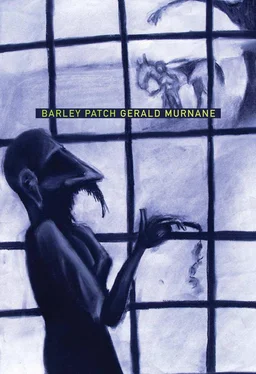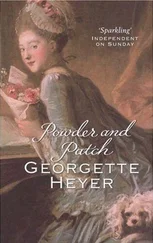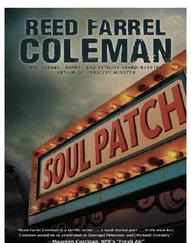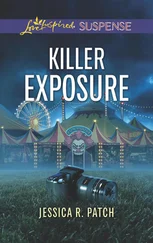Gerald Murnane - Barley Patch
Здесь есть возможность читать онлайн «Gerald Murnane - Barley Patch» весь текст электронной книги совершенно бесплатно (целиком полную версию без сокращений). В некоторых случаях можно слушать аудио, скачать через торрент в формате fb2 и присутствует краткое содержание. Год выпуска: 2011, Издательство: Dalkey Archive Press, Жанр: Современная проза, на английском языке. Описание произведения, (предисловие) а так же отзывы посетителей доступны на портале библиотеки ЛибКат.
- Название:Barley Patch
- Автор:
- Издательство:Dalkey Archive Press
- Жанр:
- Год:2011
- ISBN:нет данных
- Рейтинг книги:5 / 5. Голосов: 1
-
Избранное:Добавить в избранное
- Отзывы:
-
Ваша оценка:
- 100
- 1
- 2
- 3
- 4
- 5
Barley Patch: краткое содержание, описание и аннотация
Предлагаем к чтению аннотацию, описание, краткое содержание или предисловие (зависит от того, что написал сам автор книги «Barley Patch»). Если вы не нашли необходимую информацию о книге — напишите в комментариях, мы постараемся отыскать её.
Barley Patch — читать онлайн бесплатно полную книгу (весь текст) целиком
Ниже представлен текст книги, разбитый по страницам. Система сохранения места последней прочитанной страницы, позволяет с удобством читать онлайн бесплатно книгу «Barley Patch», без необходимости каждый раз заново искать на чём Вы остановились. Поставьте закладку, и сможете в любой момент перейти на страницу, на которой закончили чтение.
Интервал:
Закладка:
I had always been praised by my teachers for my English compositions, as they were called, and after I had joined the Journal Juniors I resolved to write and to have published something that would earn the admiration of the girl from inland Queensland. I tried for a few weeks, but none of the few paragraphs that I produced seemed anything but dull and childish, and I had to accept that the girl from inland Queensland was a far better writer than I. Not until more than thirty years later, when I was a teacher of fiction-writing and I had to deal with certain students who submitted assignments that were clearly not their own work — not until then did I have the least suspicion that the girl-writer from inland Queensland might have had more than a little help from her mother or her aunt.
I long ago became used to telling persons who had enjoyed settled childhoods in houses with bookshelves that I had never read this or that so-called classic children’s book. Sometimes, however, I was able to affect to know something of a book merely because I had read a much-condensed version of it in the Classics Comics series. Neither my brother nor I could ever afford to buy a comic, but we often read other boys’ comics. A boy-cousin of ours, the youngest child of our bookmaker-uncle, had boxes stuffed with comics under his bed, and I was sitting on the edge of that bed one Sunday afternoon in the early 1950s ready, if the opportunity arose, to spy on one or another of my girl-cousins, or ready, if my mother told me to stop burying my head in trashy comics, to step into the tiny front garden and to pretend to play, while I read in haste the adaptation for Classics Comics of the novel Westward Ho! by Charles Kingsley.
Perhaps only a few years later, I had forgotten almost all that I had looked at in the pages of the comic-book and all that had passed through my mind while I looked. Still today, however, I seem to recall several details from the line-drawings in one of the last panels of the comic-book. A young woman sits or reclines on a balcony in some or another town in the West Indies. The balcony overlooks the sea, and the young woman is looking across the sea in the direction of England, where she was born and grew up. A strand of dark hair lies diagonally across the young woman’s forehead. (I have always supposed that the hair clings to the young woman’s skin because her forehead is covered with perspiration, although the line-drawing could surely not have been so detailed as to suggest this.) The young woman is married to, or is in love with, a man whose home is in the West Indies, although she sometimes remembers another man: an Englishman who was once in love with her and may still be in love.
I had intended the previous paragraph to be no more than a report of a few details in a line-drawing that I seem to recall, but I see now that I was not able to report those details alone; I was compelled to report also a few details of a narrative the chief characters of which are a young woman and two men. Many times during the fifty and more years since I first looked through the Classics Comics version of Westward Ho! , I have tried to recall more of the details of that narrative. Sometimes I have tried urgently to do so, as if much depended on my learning all that might be learned about the narrative and the characters in it. The narrative in question is not at all the series of events that comprises the work of fiction Westward Ho! If that were so, I could visit tomorrow the nearest public library and could relieve my uncertainties within an hour or two. No, the narrative is a mysterious formation that developed I cannot say when in some or another far part of my mind. Because it developed thus and there, I accord it, rightly or wrongly, more respect than I could ever accord anything that I might have read in a book, and if ever I were able to arrange in order the items of that narrative, I would afterwards review them in my mind much more often than I have reread the pages of any of the books that have influenced me.
Whenever I seem to recall the details from the line-drawing mentioned above, I seem to be looking towards the young woman from the direction of England. I am no more than a ghost-character, perhaps barely visible to the true characters. However keenly I might feel my situation, they, natives of the countries of fiction, know joys and sorrows of a different order. Whatever might weigh on me whenever I seem to see the image-balcony and the image-strand of dark image-hair on the pale image-forehead, I am spared whatever it is that oppressed the personage whose part I have taken. If the young woman is lost to me, how much more remote must she be from the chief character: the young Englishman whose name I long ago forgot along with the few dark strokes on a white ground that once suggested his face. If my unease grows on me, I can leave off looking across a conjectured ocean towards an image of an image; I can look instead into text after fictional text for one after another young image-woman at a far image-distance from me. The young Englishman, for as long as I recall having read about him, will go on looking from the same place in my mind towards the same further place in my mind.
My looking out as a ghost-character from an image-England is other than I should have expected. One of my few vague memories of the comic-strip is that Westward Ho! was concerned with the old rivalry between Spain and England. As a Catholic schoolboy of my time, I had been well warned against the common view of the English as heroes and the Spanish as villains. As a Catholic schoolboy, I should have sided with the Spanish man who was, presumably, the owner of the house where the young woman sat or reclined on the balcony. That I seemed to have sided with the Protestant Englishman causes me to suppose that I was already, as a child, liable to be swayed by images and feelings that owed nothing to my religion; that I was already, as a child, devising a coherent mythology wholly my own.
No matter how often I look at the image in my mind of the young woman on the balcony, I learn no more of her story or of the story of the male characters in Westward Ho! Instead, I find myself often hearing in my mind several stanzas of poetry that my mother used to recite to me during the years when I was barely old enough to read for myself. During those years, my mother would often tell me what she called ghost stories in order to make me afraid or what she called sad stories in order to make me weep. Her favourite ghost story had as its chief character a ghost named Old Eric. My mother had first heard the story dramatised on radio late at night, and she told the story to me one evening when I was lying in bed before sleep.
A newly married couple arrive on the first evening of their honeymoon at an unoccupied castle that someone has made available to them in a remote district of England. The husband mentions light-heartedly the legend of Old Eric, the first owner of the castle, who had a withered leg and who preyed on young women. According to the legend, Eric could be brought back to life if his remains were moistened with female blood. While exploring the cellars, the couple find some old bones but think nothing of their discovery, not even when the wife cuts her finger on a suit of armour and blood drips to the floor. They choose for their bedroom the topmost attic-room. Then the wife prepares for bed while her husband explores some or another distant wing of the building. Soon afterwards, the wife hears the sound of footsteps on the stairs. The footsteps have an irregular rhythm, as though the person climbing the stairs has a faulty leg.
When she first told me the story, my mother had switched off the light at this point and had then left the room. Soon afterwards, I heard the sound of footsteps approaching my room. The footsteps had a distinctive, irregular rhythm, as though the person approaching had a faulty leg. I obliged my mother by screaming as though terrified. I obliged her in the same way on later occasions when I was in bed and she would imitate in the hallway the sound of Old Eric climbing the stairs in the castle. Although I was not terrified, I was concerned for the safety of the young woman. Even so, I believed she could have saved herself from Eric by the same means that I myself relied on when I woke sometimes in the early hours and supposed an intruder was in the house. She might have saved herself if she had had the wit to undress and put on her nightdress and then to lie in bed utterly still and taking only shallow breaths so that Old Eric would suppose she had already died and would then go in search of some other victim. Being ignorant of the ways of female persons, I was unable to see in my mind the young woman undressing or putting on her nightdress, but before my mother’s footsteps had reached my door I had always composed in my mind the last scene of the story of Old Eric in my mind. The young woman lay on the bed with only a sheet covering her. (The young couple had chosen high summer for their wedding and honeymoon.) She had been cunning enough to lie sprawled in the way that corpses were often sprawled in illustrations. The window of the attic room was high above the trees, so that the moonlight entered unchecked. The young woman was so clearly visible, so I supposed, that Old Eric would have taken her for a corpse as soon as he had looked in at the door. He would have done no more than look for a few moments beneath the sheet and the nightdress before he went on searching the other rooms on the upper floor.
Читать дальшеИнтервал:
Закладка:
Похожие книги на «Barley Patch»
Представляем Вашему вниманию похожие книги на «Barley Patch» списком для выбора. Мы отобрали схожую по названию и смыслу литературу в надежде предоставить читателям больше вариантов отыскать новые, интересные, ещё непрочитанные произведения.
Обсуждение, отзывы о книге «Barley Patch» и просто собственные мнения читателей. Оставьте ваши комментарии, напишите, что Вы думаете о произведении, его смысле или главных героях. Укажите что конкретно понравилось, а что нет, и почему Вы так считаете.












